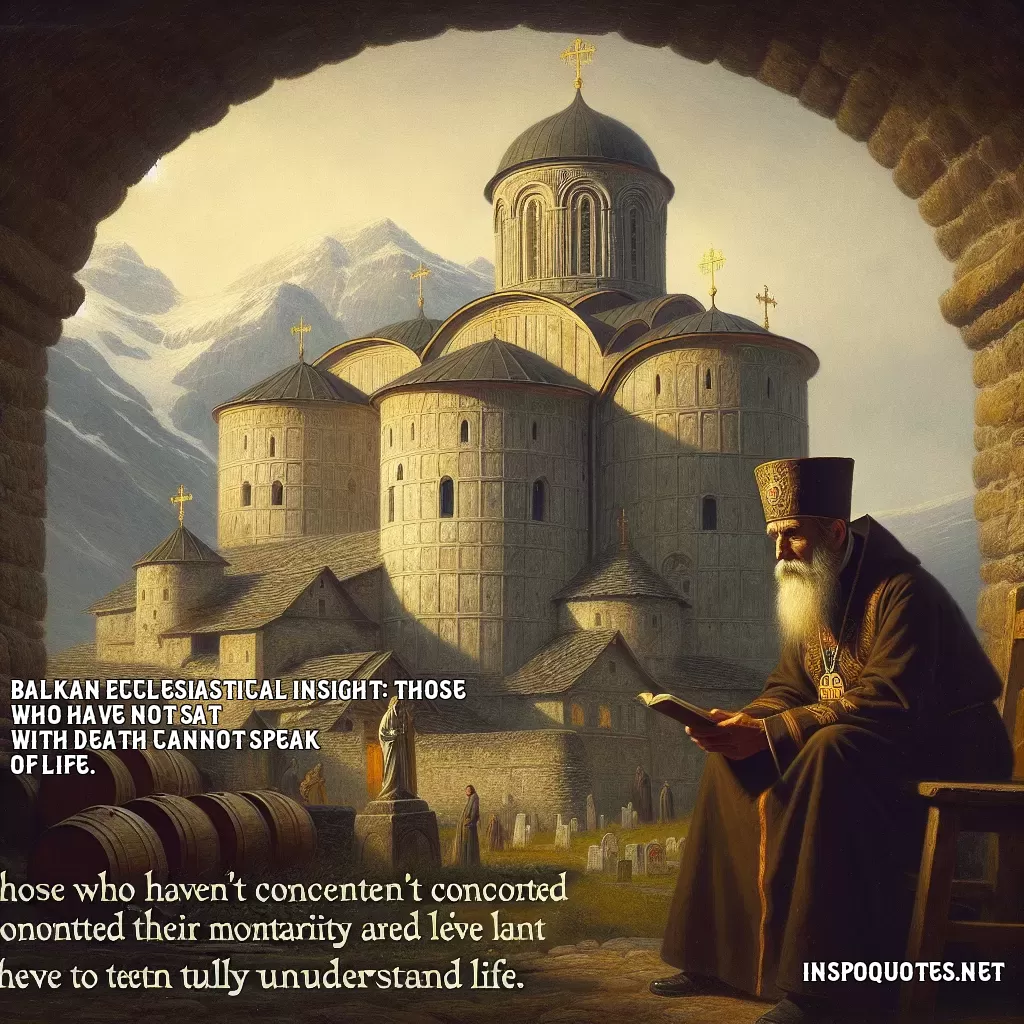
Balkan Ecclesiastical Insight: Those who have not sat with death cannot speak of life.
Author: Protopresbyter George L. F. H. H. K. Panagiotou
👁️ 12 views

Balkan Ecclesiastical Insight: Those who have not sat with death cannot speak of life.
👁️ 12 views
The quote "Those who have not sat with death cannot speak of life" attributed to Balkan Ecclesiastical Insight, suggests a profound connection between the experiences of death and the understanding of life. At its core, this statement underscores the idea that a genuine comprehension of life is rooted in an intimate awareness and acceptance of mortality. To "sit with death" metaphorically implies engaging with the concept of death—not just intellectually recognizing its inevitability, but emotionally and spiritually confronting it. This could involve experiencing the loss of loved ones, facing one’s own mortality, or reflecting deeply on the transient nature of existence. Such encounters tend to evoke a range of deep emotions and insights, reshaping our perspectives on what it means to live. The quote implies that those who have not faced these existential truths may lack a true understanding of life. Without confronting death, one's perception of life may remain superficial, lacking the depth and authenticity that such experiences bring. This is because the recognition of life’s fragility often compels individuals to appreciate and savor its moments, cultivating a sense of gratitude and purpose. Furthermore, this insight might serve as a reminder of the interconnectedness of life and death; they are not opposites, but rather two sides of the same coin. Understanding one enriches the understanding of the other. The notion invites individuals to embrace the full spectrum of human experience, recognizing that the contemplation of death can provide clarity and meaning to the way life is lived. In essence, the quote emphasizes that a mature and enriched appreciation of life is often born from a willingness to confront and contemplate the mysteries and realities of death, prompting a more authentic engagement with the world.
**Biography of Protopresbyter George L. F. H. H. K. Panagiotou**
Protopresbyter George L. F. H. H. K. Panagiotou is a distinguished figure within the Greek Orthodox Christian community, renowned for his unwavering dedication to the church and his profound impact on both spiritual and community life. Born in Greece, he embraced the rich traditions and teachings of the Orthodox faith from an early age, which shaped his passion for theology and service.
Protopresbyter Panagiotou pursued his extensive education in theology, earning degrees from prestigious institutions. His academic journey not only equipped him with profound theological insights but also a realistic understanding of contemporary challenges faced by the church and society at large. With a commitment to lifelong learning, Protopresbyter Panagiotou often engaged in further studies and dialogues that bridge the ancient traditions of the church with modern-day issues, making his contributions remarkably relevant today.
Throughout his ministry, Protopresbyter George L. F. H. H. K. Panagiotou has served in various parishes, where he has been instrumental in fostering community spirit and spiritual growth. His sermons are known for their depth and clarity, often integrating the teachings of the Orthodox Church with everyday life, which resonates powerfully with his congregation. Moreover, he has taken an active role in outreach programs and charitable activities, emphasizing the importance of service to others as a fundamental tenet of the Christian faith.
In addition to his pastoral duties, Protopresbyter Panagiotou is a prolific writer and speaker, sharing his insights on various platforms. He has contributed articles to religious publications and participated in conferences that discuss the role of the church in the modern world. His work often reflects a deep understanding of cultural and social dynamics, urging the church to engage thoughtfully with contemporary issues.
Protopresbyter George L. F. H. H. K. Panagiotou’s life is a testament to his unwavering faith and commitment to the Greek Orthodox Church. Through his leadership, writings, and community involvement, he continues to inspire others and nurture a deeper understanding of Orthodox Christianity in a changing society. His legacy is one of profound faith, compassion, and dedication to service, leaving an indelible mark on those he encounters.